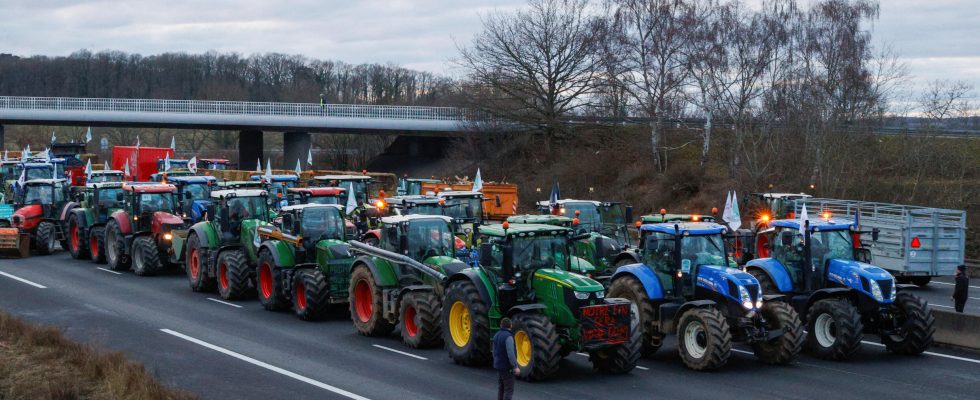The blockades of farmers are increasing this Wednesday in France despite the promises of the government, whose ministers are multiplying in all the media, passing the ball back to Brussels. A European summit is expected tomorrow, Thursday, and it will be largely devoted to this issue.
4 mins
Farmers are blocking several highways leading to Paris with their tractors. Wednesday morning, they also continued their progress to surround Lyon (southeast), the third city of France. Further north, a convoy of farmers from the South-West is heading towards the Rungis fresh produce market, the largest in the world, which supplies the Paris region. Eighteen people were arrested for “obstructing traffic” this Wednesday morning near the Rungis market which angry farmers, gathered in a convoy, are threatening to invest, we learned from police sources. Fifteen are in police custody.
In France on Wednesday there were “more than 100 blocking points” and 10,000 demonstrators, the Minister of the Interior estimated, Gerald Darmanin early Wednesday morning. Heard by the Economic Affairs Commission, the president of the FNSEA, the main farmers’ union, Arnaud Rousseau, called for “calm and reason”. Many “European issues” cannot be “resolved in three days”, he added.
The Prime Minister continues his consultations. Gabriel Attal received this morning in Matignon the representatives of the Confédération paysanne, the third agricultural union, and the Rural Coordination, the second union, after having exchanged at length with the majority union FNSEA Monday evening and Tuesday evening.
Read alsoFrance: the disappointment of farmers after Gabriel Attal’s speech
Despite support measures and announcements from ministers which are multiplying on radio and television, the government has so far failed to put out the fire and is trying to mobilize on the European front as well.
Brussels joins the dance
The 27 are working to propose adjustments to the common agricultural policy to the different European states because the discontent of farmers and its snowball effect were already in the viewfinder, reports our correspondent in Brussels, Pierre Benazet. Governments have increased their contacts, this has broadened the impact of their demands, this is for example the case for France which is sending its Minister of Agriculture to Brussels this Wednesday.
Emmanuel Macron announces an interview this Thursday with Ursula von der Leyen to talk about agriculture on the sidelines of the European summit.
The Commission has taken the lead, it has already announced measures, in particular a new derogation in 2024 on fallow land. The decision must still be taken but, a priori, farmers will not have to keep 4% of their land fallow this year to receive aid from the common Agricultural Policy.
Read alsoWhy the Common Agricultural Policy (CAP) is increasingly contested
Mercosur, a casus belli
In the same way, the Commission tries to allay fears about imports of agricultural products: it first announces a pause in negotiations with Mercosur for a free trade agreement. Paris has decided to hire a “ arm wrestling » with the European Commission to oppose the trade agreement currently negotiated with the Mercosur countries (Brazil, Argentina, Uruguay, Paraguay), declared Marc Fesneau, the Minister of Agriculture this morning. This free trade treaty with important agricultural countries “ is not good for our breeders and cannot, must not be signed as is », assured for his part the French Minister of the Economy Bruno Le Maire on the CNews channel. Paris had already loudly and clearly expressed its opposition to the conclusion of this trade agreement, causing tensions with the European Commission which is in charge of trade negotiations for the Twenty-Seven.
Then, the Commission has just announced a limitation on imports from Ukraine, concessions which are also intended to prevent agricultural issues from coming to the forefront during the European summit this Thursday, which promises to be already complicated enough on the issue of aid to Ukraine.
A movement that is spreading across Europe
The movement of anger is spreading across the continent: after demonstrations in Germany, Poland, Romania, Belgium and Italy in recent weeks, the three main Spanish agricultural unions have announced “mobilizations” across the country over the next few weeks.
Improvised demonstrations have also taken place in recent weeks in Italy, where dozens of farmers calling themselves “betrayed by Europe” protested on Tuesday with their tractors near Milan (north).
The Greek government, also faced with growing protests from the agricultural world, promised Tuesday to accelerate the payment of financial aid to farmers affected by serious floods last year.
